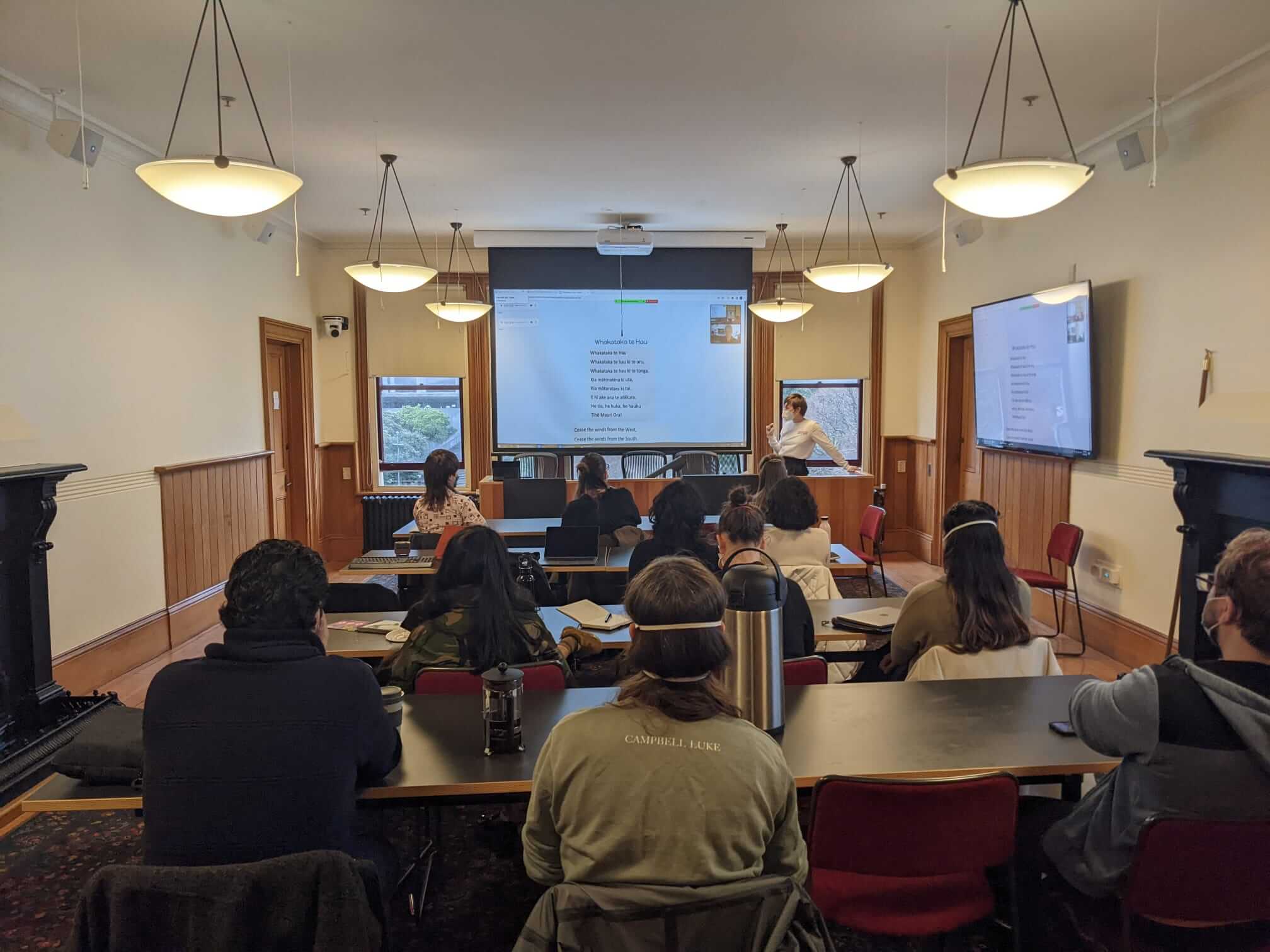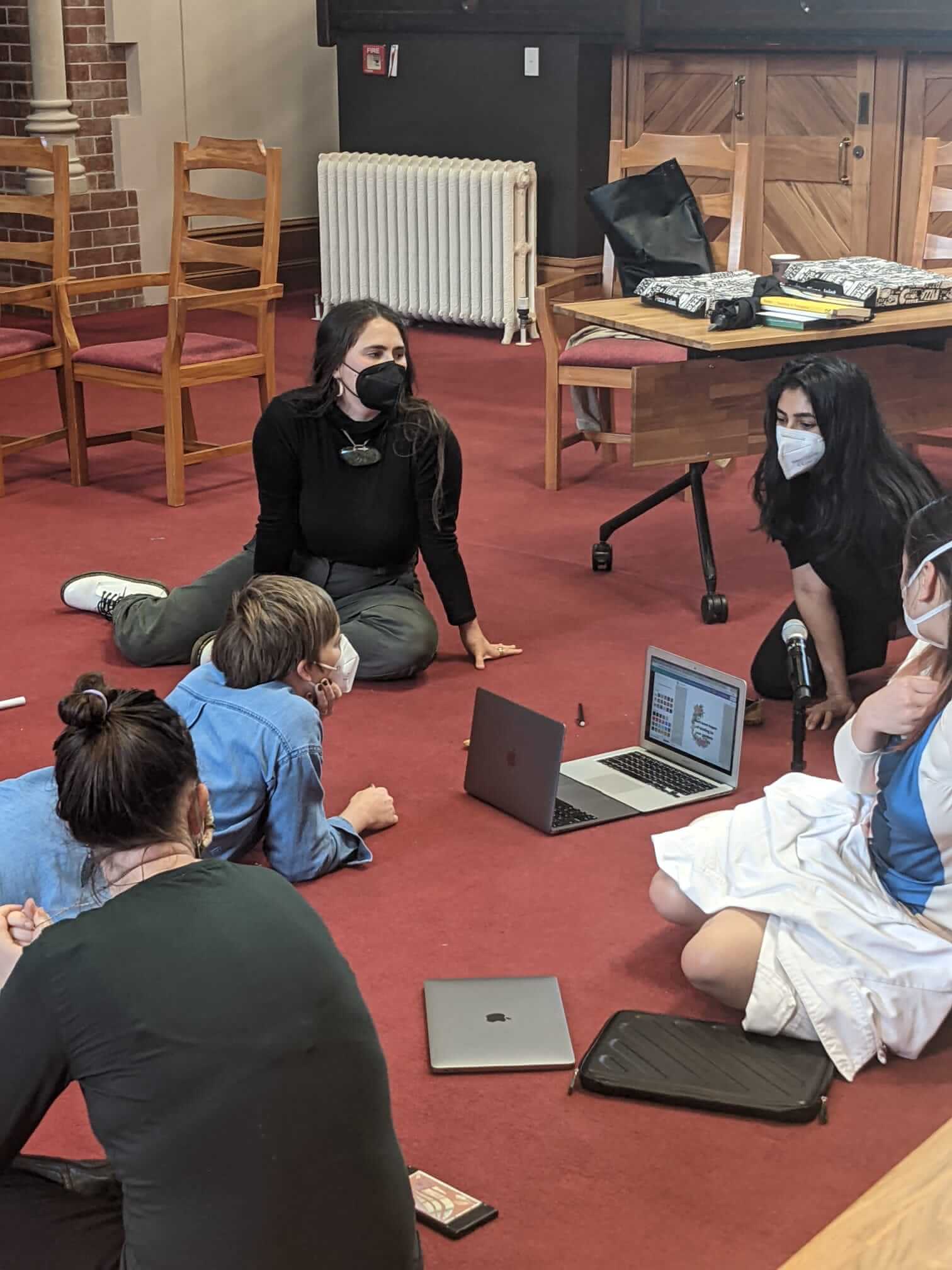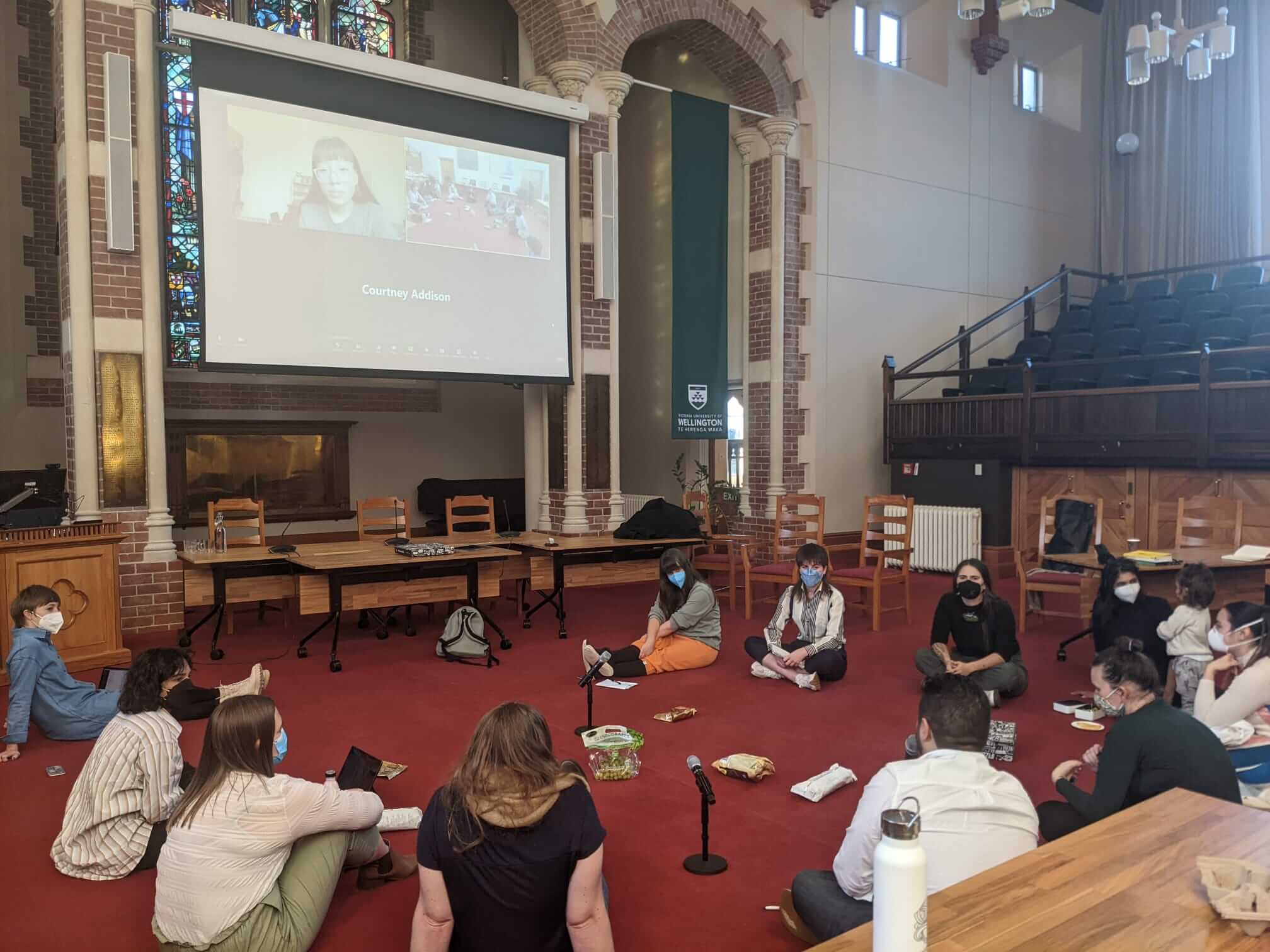Dispatches from AusSTS Wellington, Aotearoa / New Zealand
Andreja Phillips, Mythily Meher, Dinithi BowatteOctober 31, 2022 | Report-Backs
AusSTS is a network of students and early career researchers who in recent years have gathered separately but synchronously across four Australasian cities to shape an Australasian STS. In this set of letters from the Wellington node, presenter Andreja Phillips writes to a friend, keynote speaker Mythily Meher to her small son, and organizer Dinithi Bowatte to her sister, conveying the impressions, sensitivities, and provocations they carried from the event. Calling in these allies, they widen the community of STS, tying theories of care, hope, and resistance to the people and places we work with and for.
You can see photos and get other information about the workshops here – but this might be the best place to feel the vibe.

Courtney Addison Introducing AusSTS at VUW’s law school (Wellington node)
Dear Dora,
Thank you for your letter and news about the upcoming 4S conference in Cholula – how exciting! I recently attended the AusSTS2022 conference, co-organised by the Centre for Science in Society – it was great! The conference topic was ‘Generation’ – a fitting topic for this time. I was pleased they accepted my idea for a talk: ‘Seeds to seed islands – Generations of hope?’.
There was a talk about participatory photography in a conservation project – as a way of exploring the nature of more-than-human relations; one about storytelling sea rise, and another about the latest edible insect hype. There were presentations about legal implications in science fiction and AI; the invention of gender and science and technology; medical crowdfunding generating connection and (cyborg) kin; perspectives of future and youth mental health; connections between emerging infectious zoonotic diseases and public health. There are so many critical, interdisciplinary thinking journeys happening!
Hope was a central idea weaving together the conference. Anne Pollock’s keynote lecture touched on feminist efforts, situated knowledges, world building and teaching as generative practices. She also spoke of how to move beyond critique and think about what we want to see more of; so we can find a way to continue our thinking with hope in our hearts.
You would have loved the intergenerational plenary with Hana Burgess, Mythily Meher and Billy van Uitregt. It was a personal and heartfelt exchange of knowledge and wisdom. Hana and Billy brought their Māori insights to the table, Mythily her reflections about her journey as a migrant to and in Aotearoa. They talked about generations of belonging and ethics of care. It was a hopeful way to think about generations and their generative possibilities in different contexts.
Well that’s all from me for today – but I hope you are all doing very well. Please write to me after 4S and tell me all about it!
Lots of love,
Andreja

Sharing zine pages with zine facilitator Helen Yeung via Zoom (Wellington node)
To my son, Arwin:
Sometimes, all the moving parts align just right, and their symmetries seem to show, even briefly, a portal to elsewhere. This conference felt that way. Coming together around ‘generation’ (as era, as indebtedness, as ancestry, as future kin, as innovation, as creation); my first in-person conference since having you; and to have you there with me (specifically as I felt – for the first time since your birth – that joy and meaning in connection and responsibility could come from something apart from you.)
Joy matters. Dinithi was delightfully resolute in saying that joy is an active part of resistance.
This was perhaps the most caringly critical and community-minded incarnation of the worlds I participate in for work. I noticed that our presentations dealt with compelling STS questions, yet our conversations around them cared about how our various projects were contributing to a thriving Earthly future. Across the days we questioned the practice of hope, suspectful of anything feel-good that might lure us (as Emma Kowal noted) into wanting what will keep us trapped in these systems that are no good for a good life.
I loved how Courtney, Max and Dinithi picked these grand old ‘ivory tower’ rooms for the sessions, and then enabled, through the subliminal flair of their planning, for us to be so earnest in them. As we talked, presented, ate, chilled, thought together, we seemed to call in a world in which knowledge is always collectively engaged and created, carried by relationships, not individuals. A world that doesn’t need The University, giving credence to Hana’s mentor and collaborator, Donna Cormack’s notion that the academy is a temporary land and space, but with resources that we can turn towards generating something else.
I suspect by the time you’re older, you will have seriously finessed all these orientations I found revitalising at this conference. I will do my best to set you up to arrive in the thick of things well. I hope that with and beyond me you come to a real, solid understanding of how systemic oppressions work, and cultivate the kind of radical empathetic imagination to both believe experiences that you (whoever you are always becoming) could not have had, and to build ways of being and relating that this world doesn’t give you a template for.
I love you.
Mama.

Reflecting on the workshop themes during the zine workshop (Wellington node)
Dear Nangi,
I hope you liked our conference! I’m really glad you came and hope you enjoyed it. What did you like about it? Do you think you will be keen to explore interdisciplinary research more? Maybe the Centre for Science in Society (VUW) can give you some work opportunities hehe. Tim (Corballis) told me that he kept seeing you out of the corner of his eye and he thought it was me! I felt happy to see you writing down notes when you were here; Courtney said that was A+ student behaviour.
When Mythily was talking about her experiences as a migrant, it was like she found the things in my heart and spun them into words. I felt glad you were also there to hear that plenary with me – I think it made me feel safe to receive that kōrero in the way that I wanted to, that was natural to me. Sometimes it is easy to be in white dominated spaces and unthinkingly make ourselves into ‘good’ recipients of fancy knowledge. To be humble, and gracious and well mannered, as is expected of us. This is especially true in academic spaces, because we have to assimilate to the standards of academia which are standards set by white men. Lots of people either don’t want us here or think we don’t deserve to be here or think we are only here because we got diversity hired. But I don’t want to play the assimilation game anymore, and I’m proud of you for wanting better for yourself too.
Maybe you have always been like that, ever since you were a loud and disruptive baby. It makes everyone uncomfortable to visibly have and see emotions, but maybe it’s time to do that more. How can knowledge not be emotional? How could you ever receive information about the world and not feel awed, inspired, angered, joyful, pensive, romantic, goofy, whatever. I can’t remember if you were here when we were talking about care, and someone asked how we incorporated care into our research. For me (and I think probably the same for you) the question is probably – how could you not incorporate care into your research? How is it even possible that some people don’t?! Surely we are all here because we care? Because we give a shit about something enough to turn up each day, despite it all?
Anyway, I can’t wait to chat to you about this over dinner.
Love you lots!
Akka
___________________________________________________________________________
Andreja Phillips (MA Environmental Anthropology, University of Zurich/Switzerland, 2001) is currently a doctoral student with the Centre for Science in Society at Te Herenga Waka/Wellington.
Mythily Meher is tangata Tiriti, born in Maharashtra, India and raised in Auckland, Aotearoa. She currently works in public health research at The University of Auckland.
Dinithi Bowatte (School of Veterinary Sciences, Massey University, Aotearoa) is a PhD student investigating infectious disease emergence from an ecofeminist perspective using both scientific and social scientific methods.
Published: 10/31/2022
